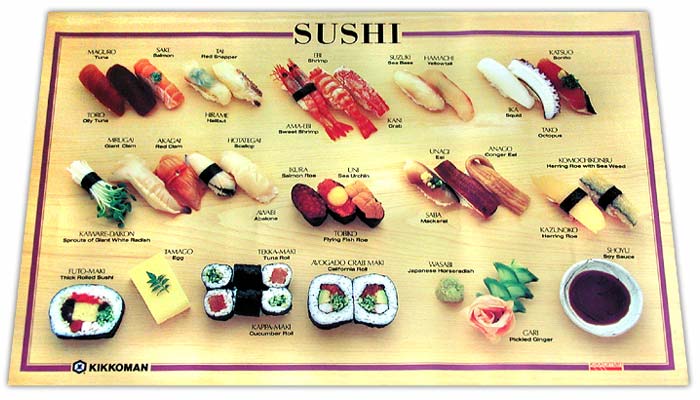
"WAAAAASAAAAAAAAAA-bi!"
Posted on 09/20/2004 6:20:03 PM PDT by modest proposal
NEW YORK (Reuters Health) - Many people believe the sushi-seasoner wasabi clears their sinuses, but new research presented this week suggests that the spicy green paste may do the opposite.
U.S. researchers found that eating wasabi appeared to increase congestion in a small group of healthy volunteers, despite the fact that participants said they thought that the spice had cleared their nasal passages.
"Actually, wasabi is a congestant," study author Dr. David S. Cameron told Reuters Health. "It makes the space of your nasal passages smaller, but it makes you feel more open."
Cameron explained that wasabi probably clogs up sinuses by increasing blood flow to the lining of the nose. That extra blood takes up space, he said, which constricts the nasal passageway.
Wasabi may make the nose feel more open, Cameron noted, by causing changes that increase the cooling effect of air breathed through the nose, or by stimulating flaring of the nostrils, which enables air to flow more easily though the nose.
Cameron and his team will present their findings Tuesday during the American Academy of Otolaryngology-Head and Neck Surgery Foundation annual meeting in New York City.
Wasabi is made by grinding the stems of the Wasabia japonica plant into a paste. This plant belongs to the same family of plants as broccoli, cabbage and mustard.
While wasabi may not work as a decongestant, previous research has suggested that it is not without other health benefits. For instance, lab research shows that wasabi may inhibit the growth of cancer cells in test tubes, prevent platelets from forming blood clots, and may even fight asthma or cavities. And, appropriately for a condiment used to season raw fish, wasabi has antimicrobial properties.
During the current study, Cameron and his colleagues from Kaiser Permanente Medical Center in Oakland, California asked 22 people to dissolve a lentil-sized amount of wasabi on their tongues multiple times at one-minute intervals, and then report whether the spice affected their sinuses. The researchers also used a device to objectively measure participants' nasal congestion before and after tasting wasabi.
Cameron explained that he and his colleagues used the minimum amount of wasabi needed to cause burning in the nose, a hallmark of the ingredient.
Although people believed that wasabi helped open their nasal passages, it actually appeared to increase congestion.
"If you love wasabi, keep eating it," Cameron said. "But if you want to recommend it as a decongestant, think twice."
I've found Vicks VapORub works pretty good and is not bad on eel.

"WAAAAASAAAAAAAAAA-bi!"
ROFL!!!
oh its emotion eric. that guy is funny
www.emotioneric.com
Real men eat Habeneros. ;-)
I'm not sure about their data, when I eat Wasabi or Horseraddish, they truly clear my sinuses. Love the burn too!
apparently that is all an illusion due to "nostril flaring" lol.
Who needs rice.
Next they'll tell my TomYam does'nt clear my sinuses eather.
Among the many interesting aspects of being a scientific researcher, objectively measuring nasal congestion can't really be near the top of the list.
Sushi BUMP!

Wasabi is a key ingredient in rocket fuel.
Wasabi, pickled ginger and sashimi.......yum. Had some last Friday and ate a lot of wasabi. And it did clear my sinuses.
I'll never forget my first experience with wasabi. My wife knew what it was and didn't warn me before I put a nickle size portion in my mouth.
Yeooooooowwwwww!
Wasabi powder is my secret ingredient for Bloody Marys. Although it is not yet widely recognized, I make the world's best.
Stop it, you are making me hungry.
Real men (and women) not only eat them, but grow several varieties of them!!!!!!!
You're making me hungry!!!!!!!!!!
Real men snort habenero seeds
(With extra wasabi sauce!)
Disclaimer: Opinions posted on Free Republic are those of the individual posters and do not necessarily represent the opinion of Free Republic or its management. All materials posted herein are protected by copyright law and the exemption for fair use of copyrighted works.